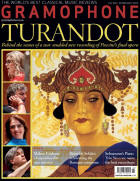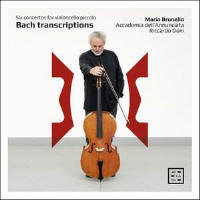Texte paru dans: / Appeared in: |
|
|
Outil de traduction |
|
|
The grass is always greener: I’ve lost count of how many Bach transcriptions I’ve listened to over the past 12 months. Most begin with a tale of envy. ‘I was just starting out, a young student playing cello in the bass section of a string orchestra’, Mario Brunello tells us, ‘whence came, perhaps, this aspiration of mine to make a cello sound like a violin.’ This recording starts off well and, indeed, Brunello’s smiling bowstrokes in the arrangement of the Violin Concerto in E, BWV1042, did initially make me think of Rachel Podger. Underpinned by generous warmth and the sheer luxury Brunello conjures from his four-string violoncello piccolo, what was not to like? Well, the further one ventures into this album, the thicker the thicket of ego through which one has to scramble. Some of the movements are indulgently slow. The Concerto in A, BWV1055, begins in delightful benevolence and the Accademia dell’Annunciata enunciate with a gloriously lazy swing (with counterpoint provided by Brunello’s Glenn Gouldian hum). But this all changes at the first solo entry. Brunello’s sound is magnificent indeed, muscular and chocolatey – but it’s not something that I can wholeheartedly enjoy. His total prioritisation of melody stops the music from singing (and dancing). The effect is a musical line so intoxicated with the issues of sound production that cause and effect are lost. This listener no longer understands why Brunello is singing other than to hear his own voice.
This is even more at play in the opening movement of the Concerto in G minor, BWV1056, which, admittedly, is also without tempo direction. But even if Bach had wished for a Largo – which he wouldn’t have, given the titled second movement – this performance is far too ponderous. In the moments of call and response, Brunello is so preoccupied with his own sound that any sense of social interaction dissipates. That the balance of these arrangements tends towards the bass, of course, enhances such problems. There are occasional moments where, quite simply, the transcriptions do not work: textures are too murky, too fussy, and the lack of treble means this listener has to do a lot of heavy lifting (where, for example, is the melody in the album’s opening track?). Or take the gorgeous sense of organic unravelling in the central movement of the Italian Concerto, BWV971: should a listener have to work so hard to feel a semblance of pulse? An intriguing set of performances that has me torn between choosing luxury or coherence.
|
|




